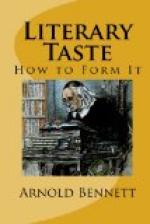The study of Wordsworth’s criticism makes the seventh step in my course of treatment. The eighth is to return to those poems of Wordsworth’s which you have already perused, and read them again in the full light of the author’s defence and explanation. Read as much Wordsworth as you find you can assimilate, but do not attempt either of his long poems. The time, however, is now come for a long poem. I began by advising narrative poetry for the neophyte, and I shall persevere with the prescription. I mean narrative poetry in the restricted sense; for epic poetry is narrative. Paradise Lost is narrative; so is The Prelude. I suggest neither of these great works. My choice falls on Elizabeth Browning’s Aurora Leigh. If you once work yourself “into” this poem, interesting yourself primarily (as with Wordsworth) in the events of the story, and not allowing yourself to be obsessed by the fact that what you are reading is “poetry”—if you do this, you are not likely to leave it unfinished. And before you reach the end you will have encountered en route pretty nearly all the moods of poetry that exist: tragic, humorous, ironic, elegiac, lyric—everything. You will have a comprehensive acquaintance with a poet’s mind. I guarantee that you will come safely through if you treat the work as a novel. For a novel it effectively is, and a better one than any written by Charlotte Bronte or George Eliot. In reading, it would be well to mark, or take note of, the passages which give you the most pleasure, and then to compare these passages with the passages selected for praise by some authoritative critic. Aurora Leigh can be got in the “Temple Classics” (1s. 6d.), or in the “Canterbury Poets” (1s.). The indispensable biographical information about Mrs. Browning can be obtained from Mr. J.H. Ingram’s short Life of her in the “Eminent Women” Series (1s. 6d.), or from Robert Browning, by William Sharp ("Great Writers” Series, 1s.).




